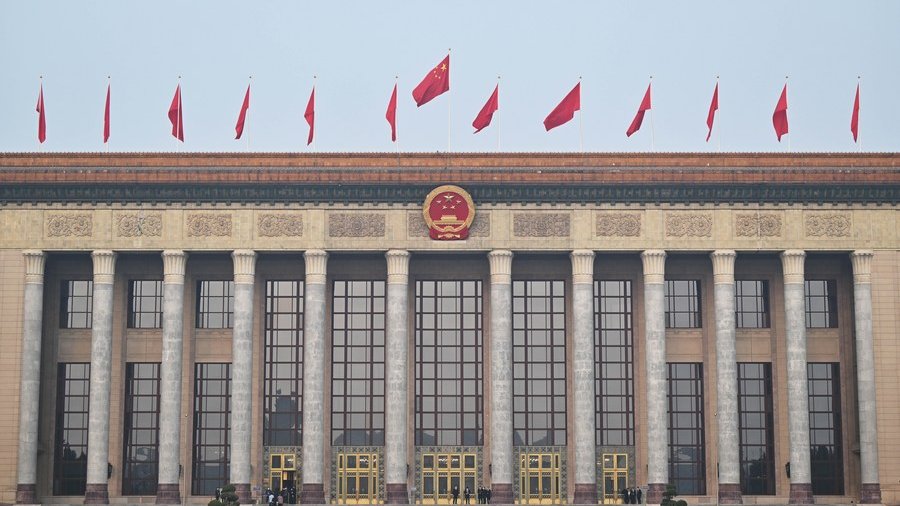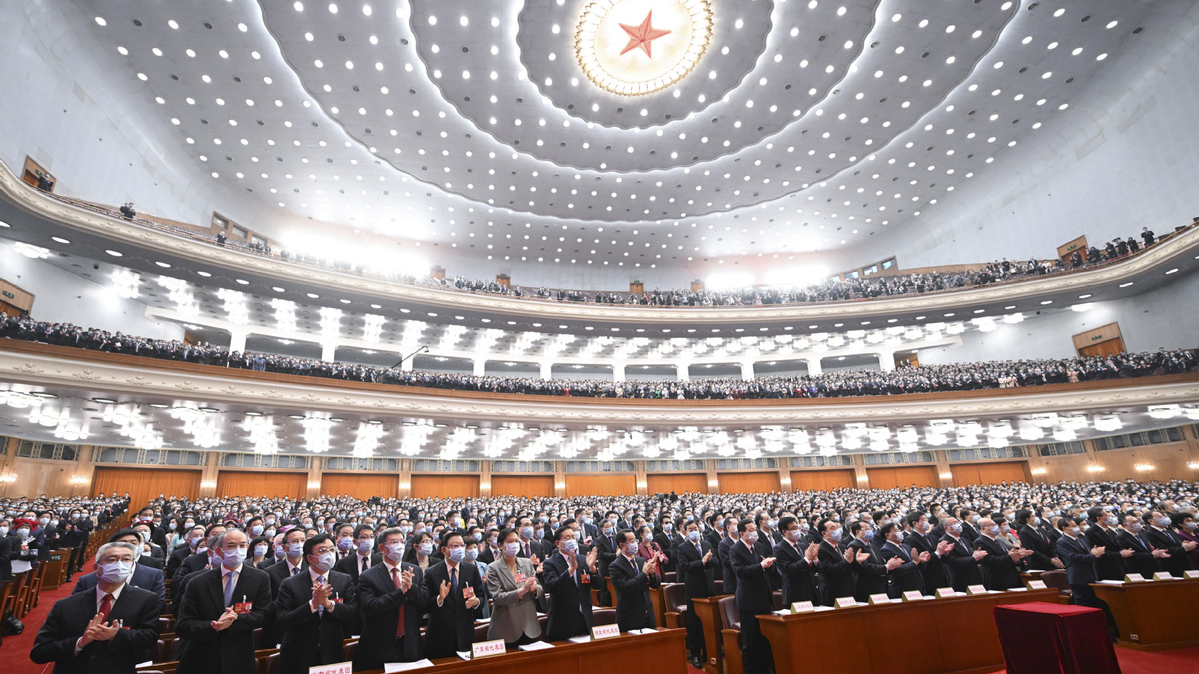
The Great Hall of the People in Beijing, China, March 5, 2023. /Xinhua
The Great Hall of the People in Beijing, China, March 5, 2023. /Xinhua
Editor's note: Xin Ge is an associate professor at the School of Public Economics and Administration, Shanghai University of Finance and Economics. The article reflects the author's opinions and not necessarily the views of CGTN.
On March 7, Chinese State Councilor and Secretary-General of the State Council Xiao Jie unveiled a plan for reforming the State Council at the first session of the 14th National People's Congress for deliberation. The reform proposal, focusing on key industries and resources to address the daunting challenges confronting the country, will exert a greater influence on China's economic and social development in the next five years in order to pursue the comprehensive construction of a modern socialist country. Among the 13 proposed aspects, three moves deserve special recognition.
There's the restructuring of the Ministry of Science and Technology. While facing stiffer global sci-tech competition, alongside the containment policy from the United States, the reformed ministry could achieve breakthroughs by better allocating resources to overcome difficulties in developing key and core technologies, ensuring the country to move faster towards self-reliance in the field.
Additionally, the newly-established financial regulator will replace the China Banking and Insurance Regulatory Commission (CBIRC) and direct supervision of the securities sector into an administration under the State Council. The setting-up of the new financial regulatory body comes as the central government seeks to close loopholes with multiple authorities monitoring different aspects of China's financial service industry valued at trillions of U.S. dollars. On the one hand, financial markets, including equity and debt would be regulated in a more holistic way; on the other hand, financial market regulation and industry policy making would get more integrated. As the plan said, this new administration will "strengthen institutional supervision, supervision of behaviors and supervision of functions" and the supervision will be "penetrating and continuous."
Meanwhile, the national data bureau, a specialized agency responsible for coordinating the integration, sharing, development and application of data resources across the domestic economy and society, will also be set up, managed by the National Development and Reform Commission (NDRC), demonstrating the significance of data as a strategic economic resource.
These key reforms are expected to facilitate technological breakthroughs and ensure financial security and data regulation.
This will be the ninth reform for state institutions since the reform and opening-up in 1978. This year's reform marks the first major systematic transformation to achieve the second centenary goal of developing "China into a great modern socialist country that is prosperous, strong, democratic, culturally advanced, harmonious, and beautiful" by the middle of this century.

The first session of the 14th National People's Congress holds a plenary meeting, Beijing, China, March 7, 2023. /Xinhua
The first session of the 14th National People's Congress holds a plenary meeting, Beijing, China, March 7, 2023. /Xinhua
The reforms are responding to new trends and new challenges, optimizing central-local relation and upgrading public service.
China is facing enormous challenges over the development of sci-tech and finance industries, while still enjoying ample opportunities in digital governance. The Ministry of Science and Technology has performed crucial functions since the era of the planned economy. Hence, several functions related to policy and planning were assigned to the Ministry of Agriculture and Rural Affairs, Development and Reform Commission, Ministry of Ecology, National Health Commission, and Ministry of Industry and Information Technology and talent introduction work was assigned to the Ministry of Human Resources and Social Security. Other functions are upgrading the whole-nation system, optimizing the whole-chain management of scientific and technological innovation will be strengthened.
In the financial sector, one distinct problem is that due to the lack of strong horizontal and vertical supervision of financial institutions, primitive financial risks have emerged. This reform will adjust the China Securities Regulatory Commission to be under the State Council, in order to establish a multi-level regulatory system.
The opportunities brought about by the rapid expansion of the digital economy, development and utilization of a series of data-related infrastructure systems have become more urgent. The national data bureau could provide an institutional foundation for the government to play an active role in the digital economy governance.
The second feature is that the proposed reforms would optimize the central-local relations in the division of central and local powers, which can be exemplified by the financial sector reform. Historically, local governments have established relevant financial offices or financial supervision agencies, but this time the vertical management would focus on the national function of finance as a tool in macroeconomic management. Therefore, a local financial supervision system with the central dispatched financial management agencies as the mainstay will be helpful.
The reform also pays attention to people's livelihood and is pinpointed to upgrade the basic public service system. The State Bureau of Letters and Calls will be adjusted to an institution under the State Council to improve the work of letters and calls. Secondly, the responsibilities for rural social undertakings and public services development would be assigned to the Ministry of Agriculture and Rural Affairs. Arrangements have been made for the relevant work during the transition period after completion of the national poverty alleviation, which will realize rural revitalization and build a strong agricultural nation.
As the 20th CPC National Congress report writes, the problems of imbalanced and insufficient development remain eminent. To address these problems requires not only top-level design of policies, but reinforced organizational leadership. The Chinese government will optimize the governance system to enhance governance capacity to facilitate Chinese modernization.
(If you want to contribute and have specific expertise, please contact us at opinions@cgtn.com. Follow @thouse_opinions on Twitter to discover the latest commentaries in the CGTN Opinion Section.)